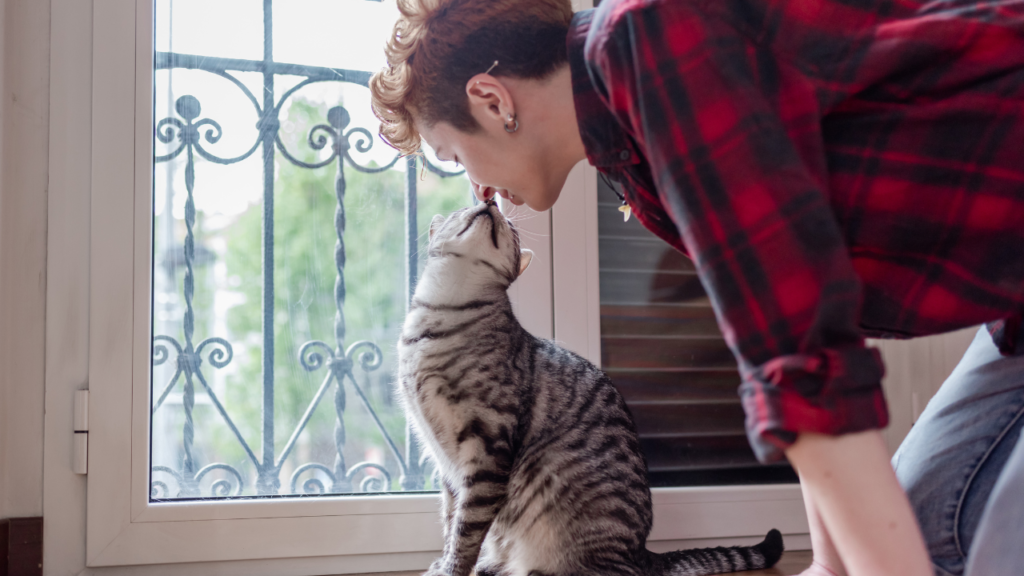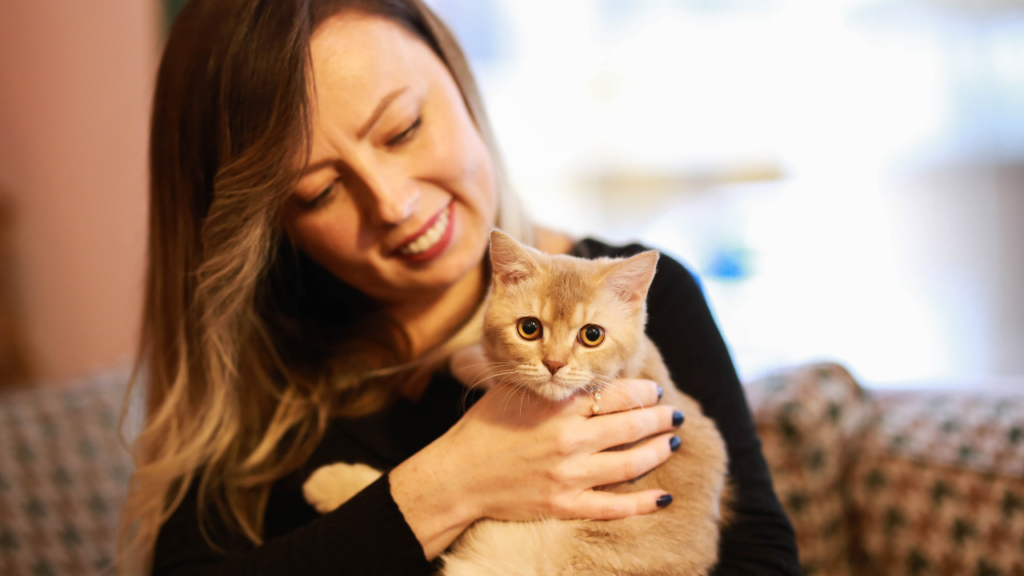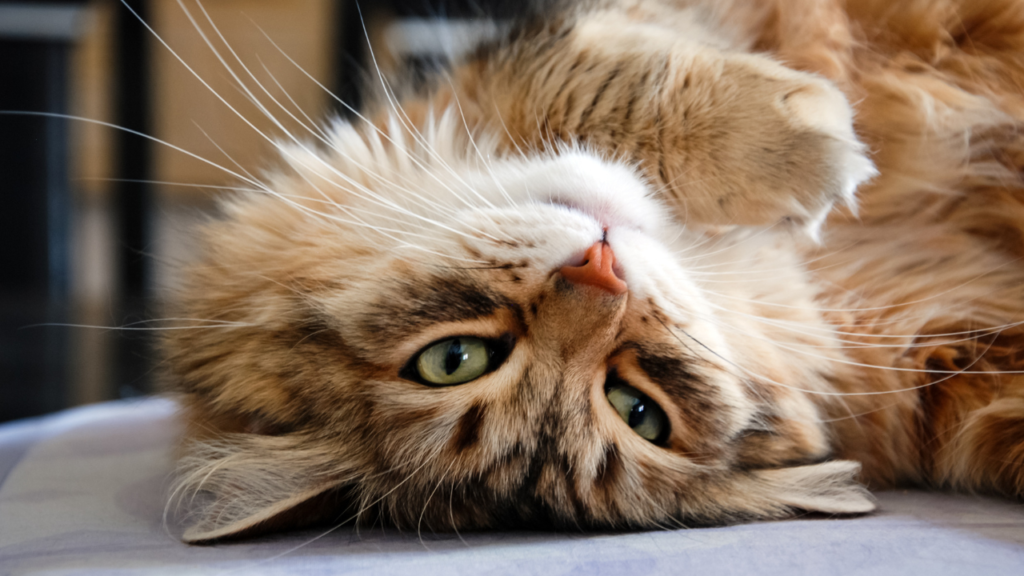
Cats have their own unique methods of expressing affection, and once you grasp their love language, you can effortlessly say “I love you” to your cat in a way they understand. And if you comprehend your cat’s affectionate expressions, you’ll form a closer bond with your furry companion. Here are some adorable ways to express your affection for your feline companion. Let’s see how to tell your cat you love them in 15 ways.
Blink gently and gaze lovingly into her eyes.

Your cat may not like being showered with kisses (and she may think you’re crazy if you try), but you may “kiss” her in a kitty way by meeting her adoring stare. Most cats express affection by staring at someone they trust and gradually closing their eyes. You can return this show by approaching her level, meeting her eyes, and slowly blinking back at her. Kitty will understand what you are trying to express.
Mimic Her Voice
If you have a chatty cat, you might find that she has specific meows, coos, or trills reserved for humans she is close to.Imitate her sounds in a romantic way. She’ll see it as a sign of affection from you, and you’ll be making her feel protected, secure, and loved.
Allow Her To Rub On You.
Have you ever puzzeled why your cat rubs on your leg or presses her head against you? Cats have particular scent glands on their faces and heads. When your cat rubs against you, it is feline body language similar to human hugs or cuddles. She is offering you the highest compliment by leaving her fragrance behind and claiming you as a member of her family.You can accept this gesture by letting her claim you. Lean into her small kitten head buttocks, nuzzle your face against hers, and don’t move while she winds herself around your legs. You may even be able to instigate part of the behaviour yourself. While head butting your cat is unlikely to work, you can stretch your index finger towards her nose, allowing her to rub her cheeks against your hand.
Groom her.
Another way cats distribute their fragrance is by grooming, which fosters a sense of family and belonging. While replicating her motions exactly is not a smart idea , you may still express your love by “grooming” her in the human way.
Do Not Skip the Vet.
Okay, so your cat may not see a trip to the vet as a display of affection, but she will not hold it against you. And, while going to the vet is certainly not your cat’s favourite thing to do, it is hands down one of the finest ways to show you care.
Cats are excellent at concealing symptoms of illness and discomfort—even through their body language, they rarely demonstrate that they are in pain or unwell. Without regular visits to the veterinarian, you may miss a critical opportunity to diagnose and treat minor health problems before they become major ones.
Say “I love you” to your cat by caring for her health so she can have a long and happy life with her favourite person!
Give them space.

Although you may want to embrace and squeeze your cat to express your love and affection, cats are not always in the mood for such hands-on attention.
If your cat indicates that they require space, respect the boundaries they establish. This does not imply that they do not love you. They might just need some alone time! Allowing your cat to initiate affection demonstrates that you both respect and adore them.
Gently massage them.
Most cats enjoy a mild massage. Every night, I’d spend quality time with my cat, Turtle. I would read my book while she cuddled up and I softly massaged her.
This is also an excellent time to conduct a wellness check, looking for any unusual lumps, scrapes or tender spots.
Give them boredom. Busters
Cats are inherently interested and energetic. When they don’t have enough opportunity to keep their thoughts active, they frequently experience stress, which can lead to anxiety.
Giving your cat interactive toys or places to watch birds and squirrels will help keep their mind active and prevent boredom, especially if they are left at home alone all day.
Let them hunt!
Cats are natural hunters. Even tame cats have a natural instinct to hunt and kill their prey. When you promote this behaviour and provide ample opportunities for your cat to hunt safely indoors, they will know you adore them.
Introduce change at their pace.
Cats enjoy routine. When you introduce a new person or animal into their life, it may appear insulting to them at first.
Give your cat time to adjust to new situations. For example, if you get a new cat, let them sniff each other through a door for a while before making formal introductions. You can even separate them for a few days, feeding them on opposite sides of the door, until they become accustomed to each other.
If you generally leave a door open, do not close it just because you have visitors. This may indicate to your cat that you are limiting their domain, and they will grow agitated.
Use Pheromones to Reduce Their Anxiety.
What we consider negative behaviour (e.g., peeing outside the box) may actually be anxiety.Always address the source of your cat’s worry. This article about cat anxiety could help. Then focus on restoring your cat’s peace of mind.
Give them running water.
It’s no secret that cats enjoy rushing water! One reason is because drinking from bowls might damage their whiskers.
Cats use their whiskers to sense the world around them. When their whiskers strike the edge of their bowl too repeatedly, they can get whisker fatigue, also known as whisker stress. Essentially, they are experiencing sensory overload.
Water fountains designed for cats can help tackle this issue without leaving your tap running and racking up a large water bill!
Give Them a Zen Zone
Your cat may want to have their own space, one that is truly theirs, where they may feel safe and comfortable. This could be a room, a corner of a room, a cat cave, or a cat tree.
Wherever you or your cat decide to build this shelter, it should be a pretty solid location so your cat has a safe place to relax when agitated.
Never punish your cat by restricting them in their Zen Zone!
Don’t force them to interact.
We all enjoy showing off our dogs. However, given how sensitive cats may be, forced interaction, particularly with strangers, can cause significant discomfort and worry.
Even if it’s just the two of you, your cat may want some alone time. Please do not take offence at this. When you provide your cat with the personal space it requires, they will know you adore them.
Acknowledge Their True Cat Nature
Allowing your cat to be themselves is one of the best ways to show them how much you love them! Cats are not particularly mysterious if you grasp their nature.
FAQ
Can you make your cat love you?
Cats are discerning creatures, and you cannot force your cat to love you. Disrespecting her personal space—or going too far the other direction and entirely ignoring her—will not help your human-feline bond.
However, you can use the procedures outlined here to gradually form a bond with your cat – on her terms, of course!
How Do Cats Choose Their Person?
Sometimes it appears like cats choose the least “cat person” to attach themselves to. Cats, on the other hand, often choose the person who best understands their distinctive cat behaviour, even if they do not consider themselves a “cat person.”
They may even unintentionally replicate cat behaviour, which indicates to the cat that the person understands them. Bottom line: if you want to be picked as your cat’s person, make an effort to learn cat language!
Does my cat miss me when I’m gone?
The short answer is: perhaps! Cats enjoy routine and predictability. So, if you’re normally around and now you’re not, your cat probably misses you.
Furthermore, in a poll of over 3,000 cat parents, around one in every ten cats exhibited signs of separation anxiety.
Most cats show their sadness differently than dogs or other pets, thus understanding cat body language allows you to easily spot indicators that your cat is stressed when you are not around.
Does my cat recognise my voice?
Yes! According to studies, cats can recognise their owners’ voices. Now, whether or if your kitty companion notices you is another issue!Cats may be amazing companions. When you take the time to study and decipher your cat’s behaviour, you may expect to form a beautiful bond with him.
